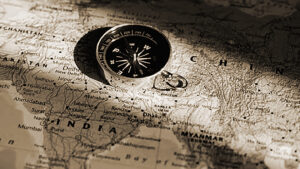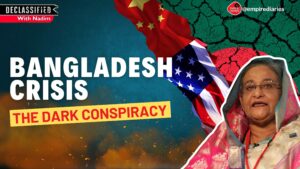(This opinion piece was originally published on CGTN.com)
While the global media is busy covering the Russia-Ukraine conflict in granular detail, there’s barely any attention on a crisis snowballing in Africa. Slowly, silently, and surely, the continent is turning into a gigantic hotbed of terrorism on an unprecedented scale.
Terror networks and terror-related escalations first intensified a few years back in the sub-Saharan country of Mali. Then in recent times, jihadists took their destabilizing activities beyond Mali to neighboring Burkina Faso and Niger.
In more recent days, the fast-growing tentacles of terrorism went beyond the Sahel region and reached Africa’s western coastline. With the Sahel already in terrorism’s vice-like grip, Benin, Côte d’Ivoire, and Togo have now emerged as the new hubs of jihadist groups.
The Mogadishu attack
The Somali capital of Mogadishu was recently in the news when Al Qaeda-linked terror group Al Shabaab carried out a deadly siege at an upscale hotel, resulting in more than 20 deaths. News of the attack, however, was quickly swept aside by sustained media coverage and an unending torrent of headlines about developments in Ukraine.
Mogadishu served as an alarming sign of how far and wide terror organizations have spread their wings across Africa – spanning the whole of the Sahel from Senegal to Djibouti; the countries along the Gulf of Guinea in the west; and the eastern coastline centering on Somalia.
It’s not Al Qaeda alone but terror groups affiliated with Islamic State, or Daesh, as well that are carrying out disruptive activities. Mali, Burkina Faso, and Niger are already badly hit by jihadist terrorism. Terror groups are also stepping up attacks in Senegal, Nigeria, Chad, and Sudan.
Alarming findings
A close look at the latest situation shows us why the problem deserves urgent global attention. According to the 2022 Global Terrorism Index (GTI), sub-Saharan Africa accounted for 48 percent – or nearly half – of all terror-related deaths worldwide during the previous year.
The findings revealed that the Sahel is now home to the world’s fastest-growing terror networks. Last year, Islamic State, considered the world’s most dangerous terror group, was responsible for 15 deaths per attack it carried out in Niger, a Sahel country.
What we are seeing is that Islamic State, which was largely driven out of Iraq and Syria, is now blossoming across Africa, having started out in the Sahel region. Straddling 14 countries, the Sahel alone has witnessed a sharp 10-time escalation in terrorism deaths since 2007. Sub-Saharan Africa’s Niger, Mali, and Burkina Faso, along with centrally located DR Congo, were the worst hit in the past year, featuring as four of the top 10 countries with the biggest jump in terrorism deaths.
Escalating violence
The Africa Center for Strategic Studies, which tracks terror-related developments on the continent, came up with some chilling findings this August. One of them is that violence related to jihadist terrorism in Africa has straightaway doubled since 2019.
The watchdog’s findings call upon the international media and global powers to focus their attention on the western Sahel and Somalia, which together accounted for 95 percent of the spike in terrorism-related violence in Africa since 2019.
Al Qaeda and Islamic State apart, the Mali-based Macina Liberation Front, also known as Katiba Macina, is another terror entity that wreaked havoc during this period. Other highly active terror bodies are Nigeria’s Boko Haram and Ansaru, Somalia’s Al Shabaab, and Mozambique’s ASWJ.
Not surprisingly, the escalation of terrorism in Africa comes amid repeated counterproductive campaigns by France to ostensibly snuff out jihadist activities in the Sahel. President Emmanuel Macron’s administration recently announced an unceremonious exit of French anti-terror forces from Mali after a fallout with the country’s junta government. The standoff worsened when Mali publicly sought an emergency meeting of the UN Security Council, accusing French forces of fanning terrorism in the African country instead of trying to quell it.
France has been involved in anti-terror operations in Mali twice – it didn’t go well on both occasions. Operation Serval in 2013 only managed to drive the jihadist forces to the countryside, while Operation Barkhane in 2014, covering Mali, Niger, and Chad, hardly dealt terrorists a decisive blow.
Then there was the troubled anti-terror campaign of the EU-led Takuba Task Force, which also wrapped up its operations in Mali and Chad. The forces had troops from over a dozen European countries. The MINUSMA, or UN Multidimensional Integrated Stabilization Mission in Mali, too, has so far failed to effectively weed out terrorism despite the presence of its 15,000 peacekeeping forces.
Recently, Iran made an interesting remark on the deteriorating terror situation in Africa, blaming it on foreign meddling, without going into specifics. Foreign Minister Hossein Amir-Abdollahian said during a trip to the Malian capital of Bamako that “interference by some extra-regional countries is the reason behind the formation of some terrorist groups in West Asia and Africa… countries [should] be allowed to act independently.”
Baffling silence
It is perplexing that the U.S., which claims to be at the forefront of the global war on terror, has hardly shown much interest in stopping Africa from getting engulfed by jihadist terrorism.
In August, U.S. Secretary of State Antony Blinken made a high-profile tour of South Africa, DR Congo, and Rwanda. Just as Africa was seeing an unprecedented expansion of terror networks, the U.S. diplomat focused his trip only on countering so-called Russian influence, and on resolving a DRC-Rwanda row. Terrorism was not on Blinken’s agenda when it should definitely have been.
A vast number of Africans, especially in the Sahel, are facing an intensifying food crisis. With terrorism worsening their woes, it is high time global powers that are genuine stakeholders in the fight against terrorism, along with the influential international media, come together to help Africa combat the specter of terrorism. The world needs to wake up to the reality that Ukraine is not the only gripping crisis out there.
REPUBLISHING TERMS:
All rights to this content are reserved. If you want to republish this content in any form, in part or in full, please contact us at writetoempirediaries@gmail.com.











